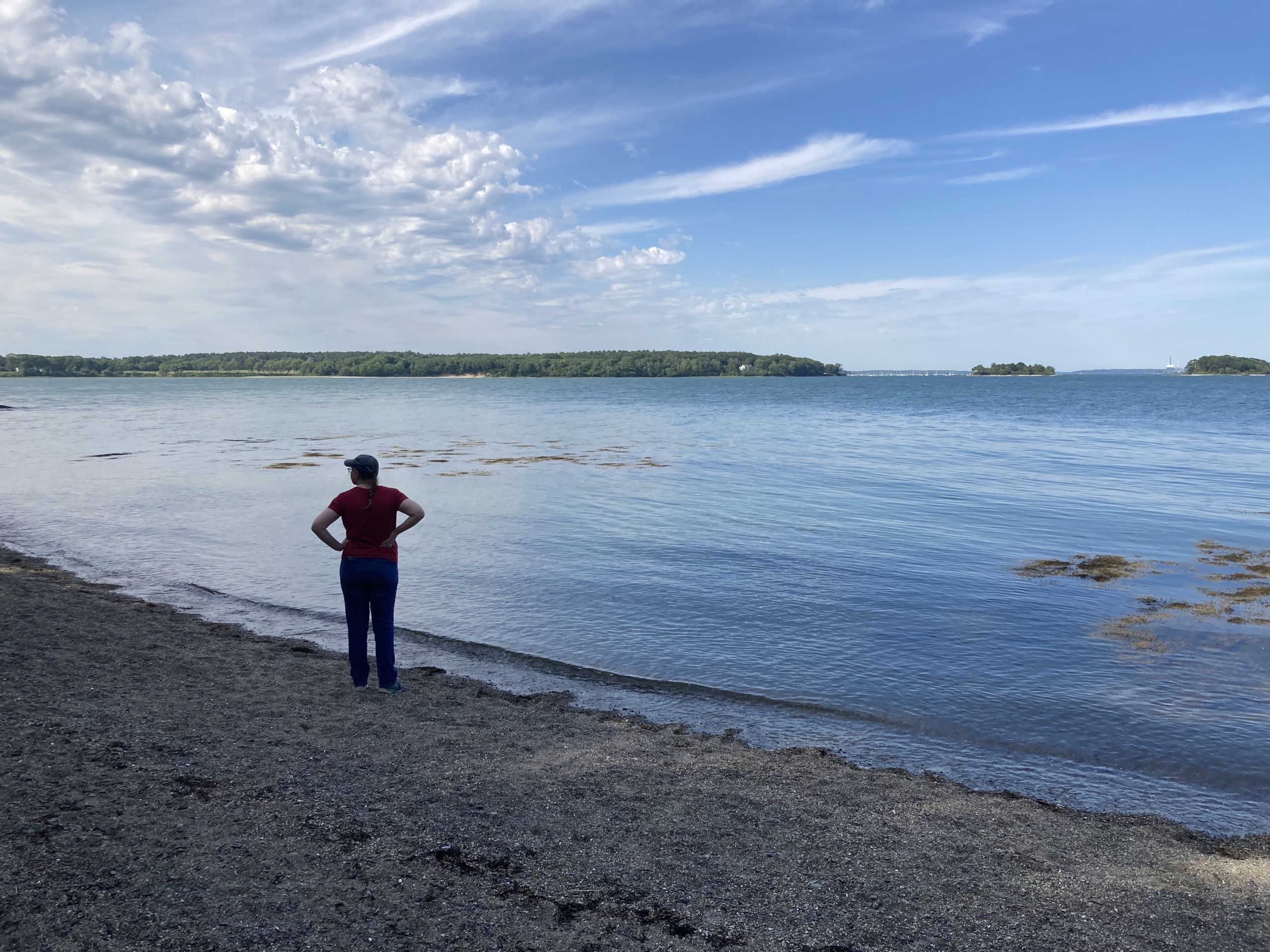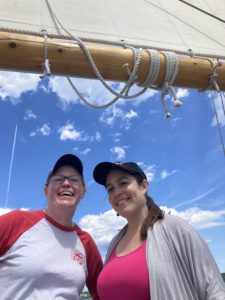Interview by Sandra Beasley
Twenty years ago, I met Maureen Thorson while we were in poetry workshops as undergraduates at the University of Virginia, and our friendship grew in her many years of living in Washington, D.C. During a 2021 pandemic lull, I ventured up to see her home outside Portland, Maine, and toast news of a forthcoming book. Earlier this winter, we connected to discuss how Share the Wealth came together.
Boog City: Give us a sense of where you live. What should we know about your house, neighborhood, or daily rituals?
 Maureen Thorson: I’m in Falmouth, Maine, within walking distance from the Maine Audubon sanctuary. I can just walk over there in the morning and spend an hour rambling through an apple orchard—there’s a pond, several meadows, there’s forest. It’s all along the Presumpscot River estuary so there are little coves and places where creeks are coming out into the estuary. I’ve never had the opportunity before to have something so constant, but always changing. Day by day I see the meadow grow taller and certain things bloom, and die back, but also, “Oh crap, there’s a bald eagle eating a fish! I did not see that yesterday, I will not see that tomorrow; it’s just a today, one-time only limited engagement.”
Maureen Thorson: I’m in Falmouth, Maine, within walking distance from the Maine Audubon sanctuary. I can just walk over there in the morning and spend an hour rambling through an apple orchard—there’s a pond, several meadows, there’s forest. It’s all along the Presumpscot River estuary so there are little coves and places where creeks are coming out into the estuary. I’ve never had the opportunity before to have something so constant, but always changing. Day by day I see the meadow grow taller and certain things bloom, and die back, but also, “Oh crap, there’s a bald eagle eating a fish! I did not see that yesterday, I will not see that tomorrow; it’s just a today, one-time only limited engagement.”
Where does a poem begin for you? What do the initial drafts look like? Do you have any tried and true revision techniques?
I do a lot of writing from prompts. Some people think of prompts as just something you do as an exercise, but I find that nobody seems to react to the same prompt the same way. People get wildly different poems out of the same prompts. So I have no compunction about using prompts to get started.
I’m a quick writer, and I get initial drafts down pretty quickly. I have friends who I do generative prompts with, and I’m really interested to see that for some of them it’ll be like, wow, I hear the final poem and there’s two words from the first draft. With my first draft, I often feel like sixty percent of that is going to wind up in the final poem. But often the finished poem ends differently than the first draft. A lot of my revision is about trying to complicate, or change up, endings.
As for revision techniques, the only one I have that I think works is to keep poking. One day’s revision could just be taking out a comma. But if I keep at it and don’t spend a huge amount of time on any individual poem, just make a little bit of change here and a little bit of change there, eventually everything seems to get spruced up to the point where either I’m like, “Okay poem. You’re done” or “you’re never going to be done.”
Do you think of this collection, Share the Wealth, as an extension of previous writing projects? Or does it feel like it was a specific turn, even a disconnect?
My prior two books were very organized around a specific form, and a specific theme. In my first book, Applies to Oranges, the poems are not formal sonnets, and they’re not all 14 lines, but they are short, squat poems of sonnety line length. They have some of the same concerns formally; I liked exploring and resolving a problem within that sonnet shape.
Then, with My Resignation, I was really trying to braid together poems out of snippets of overheard speech. I wanted to create poems that had loose connections, not perfect logic, a more lyrical and emotional flavor.
With this project, it’s hard to say it was even “a project.” When I moved to Maine, I thought, “I want to really learn how to write individual poems.” But you do that long enough and eventually you have a whole bunch of them and you’re like, “Huh. Now I have to try to make these guys play together.”
Can you speak to how the ordering of the book came together—any particular breakthrough in what was otherwise a rough patch?
I originally had a three-section order, loosely based around seasons. Then I took a two-semester manuscript organization class through the 92nd Street Y with Kathleen Ossip. At the end of that, the last section was almost unchanged, but the poems in the first and second sections had switched order. A lot of poems were cut and new poems brought in.
The seasonal approach wasn’t working for people, particularly readers in urban environments. Having a lot of poems about nature interspersed with poems not about nature was very whiplash-inducing. The bulk of the nature poems are now in the second section, where they reinforce each other a little bit better than they did when they were scattered.
I’m always struck by your poems, because I do think of them as having this kind of analytical concise quality, but then also they get kind of absurdist and lush and the language blooms. Is there anyone you feel influenced by, or who you read to freshen up your excitement about language and syntax?
A lot of these poems were written while I was taking different workshops online with Hoa Nguyen. She has traditionally organized each of her workshops around a specific book or poet. I took her Sappho and Anne Carson workshop while I was writing these poems, then another one on James Schuyler’s work, one that was about C.D. Wright and documentary poetics, and another one that focused on Lorine Niedecker. So they are the guardian angels hanging out at the back of these poems.
One person I have “discovered” since moving here—which seems silly—is Thoreau. I read Walden in high school, like everybody reads Walden, but his diaries are just amazing. Every entry is about what’s happening in the natural world that day. It’s been very interesting to come from the south and live in a New England landscape, where I can follow his diaries day-by-day and see the same plants, same types of animals. He’s very masterful with metaphors and similes. They’re very surprising, often highly illustrative, so it’s been interesting to just read a little bit of that.
Moving to a new culture, the new landscape, and all the workshops I’ve taken—they’ve reinvigorated my writing practice completely. When you have a lot to chew on, sometimes you get a book out of it. I did.
Click to Visit More from and on Maureen Thorson
—Reading at Welcome to Boog City 15.5 Arts Festival
· On March 8, 2022 at
7:30 p.m. eastern, Veliz Books will host a virtual launch reading for Maureen
Thorson’s new poetry collection, Share the Wealth. To obtain the Zoom link
and other event details, visit fb.me/e/1bdLnQff9.
· On March 16, 2022 at 6:00
p.m. eastern, Maureen Thorson will read in-person with Meghan Sterling and Dawn
Potter for the inaugural 3×3 reading series hosted by Lily Greenberg at Trinity
Episcopal Church, 580 Forest Ave., Portland, Maine. For more info: https://lily-greenberg.com/3×3-poetry-series/.

Maureen Thorson and Sandra Beasley on deck in Maine, June 2021 during a sail on Caso Bay.
SANDRA BEASLEY (www.SandraBeasley.com) is the author of Made to Explode; Count the Waves; I Was the Jukebox, winner of the Barnard Women Poets Prize; Theories of Falling, winner of the New Issues Poetry Prize; and Don’t Kill the Birthday Girl: Tales from an Allergic Life, a disability memoir. She also edited Vinegar and Char: Verse from the Southern Foodways Alliance. She lives in Washington, D.C.
MAUREEN THORSON (www.maureenthorson.com) is the author of the full-length poetry collections Share the Wealth (Veliz Books), My Resignation (Shearsman Books), and Applies to Oranges (Ugly Duckling Presse). She is the founder of NaPoWriMo, an annual project in which poets attempt to write a poem a day for the month of April. She lives in Maine.

